Happy Thursday! YIMBY activists and fans of the book Abundance may decry the difficulty of building anything in most cities, but there are still exciting infrastructure projects in the works. Most notably, “Cat Town” in China, by YouTuber Xing’s World. Xing is slowly 3D-printing a cat-scaled city for Mr. Nice and Tutu, that includes a MeowDonald’s, a movie theater, a chic house, a supermarket, a bank, and a functioning subway.
Quick Hits: Today’s Top Stories
- Survivors and family members of victims of a 2023 mass shooting in Maine filed a federal lawsuit Wednesday alleging the U.S. Army’s negligence directly caused the shooting in Lewiston that killed 18 people, including a 14-year-old boy. The lawsuit, which has more than 100 plaintiffs, accuses Army officials of ignoring warnings about Army reservist Robert Card’s deteriorating mental health and failing to remove his access to firearms despite promises to his family. Card opened fire at a bowling alley and bar in October 2023 before dying by suicide, with a fellow reservist having warned others in September: “I believe he’s going to snap and do a mass shooting.” An independent commission found multiple missed opportunities for intervention by both Army officials and civilian law enforcement as Card’s condition deteriorated.
- Gov. Ron DeSantis announced Wednesday that Florida would work to eliminate all childhood vaccine mandates for schools, which would make it the first state to completely phase out requirements that protect against measles, polio, chickenpox, and other diseases. During a news conference, Florida Surgeon General Joseph Ladapo called current mandates an “immoral” intrusion on parental rights and compared them to slavery.
- U.S. District Judge Allison Burroughs ruled Wednesday that President Donald Trump’s administration violated Harvard University’s constitutional rights by freezing $2.2 billion in research grants over antisemitism concerns, and ordered payments to resume. The decision found the administration used antisemitism as a “smokescreen” for an ideologically motivated assault on the university and failed to follow proper federal procedures. The White House plans to appeal immediately, calling the Obama-appointed judge an “activist” and maintaining Harvard remains ineligible for future grants.
- The Texas Senate gave final approval Wednesday to House Bill 7, allowing private citizens to sue anyone who manufactures, distributes, or provides abortion pills to Texas women. The legislation, which exempts pregnant women from damages, creates a civil enforcement mechanism, offering successful plaintiffs at least $100,000 in damages, and is aimed at out-of-state providers who ship abortion pills to Texas women through telemedicine consultations. Gov. Greg Abbott is expected to sign the measure.
- House Republicans voted Wednesday to establish a new subcommittee to reinvestigate the January 6, 2021, Capitol attack, using a procedural rule to avoid a standalone vote on the controversial panel. Rep. Barry Loudermilk will chair the select subcommittee of the House Judiciary Committee, continuing his previous work targeting the original January 6 select committee’s findings. The panel will consist of five Republicans and three Democrats and must publish a final report by December 31, 2026.
- Broadcast network Newsmax filed an antitrust lawsuit Wednesday against Fox News and Fox Corporation, accusing the conservative media giant of illegally monopolizing the right-leaning pay-TV news market. The lawsuit alleges Fox uses exclusionary contracts with distributors to suppress competitors and seeks damages under federal antitrust law, though the complaint did not specify an amount for damages. Newsmax claims Fox imposes penalties on distributors who carry competing right-wing channels and has engaged in intimidation tactics against the company. “Newsmax cannot sue their way out of their own competitive failures in the marketplace to chase headlines simply because they can’t attract viewers,” a Fox News spokesperson said in response.
- Iran had increased its stockpile of near-weapons grade uranium to 972 pounds before Israeli strikes earlier this year, the International Atomic Energy Agency said in a confidential report, seen by the Associated Press on Wednesday. The uranium enriched to 60 percent purity—close to the roughly 90 percent needed to reach weapons-grade—is enough for 10 nuclear weapons if enriched further, and is an increase of 71.2 pounds since the agency’s last report in May. The report also notes that Iran’s total enriched uranium stockpile—at all levels of enrichment—is almost 22,000 pounds, an increase of almost 1,400 pounds since the last report. (To learn more about Iran’s nuclear program, read the August 25 TMD.) Also, satellite images show Israel has intensified construction of a major new structure at the Dimona nuclear research center that experts say could be either a new reactor or nuclear weapons assembly facility.
- Sen. Mark Warner said Tuesday that Trump administration officials canceled his classified meeting Friday with National Geospatial-Intelligence Agency staff after far-right activist Laura Loomer launched public attacks against him and the agency’s director. The Virginia Democrat’s routine oversight visit to the facility was scrapped after Loomer branded Warner a “rabid Trump hater” and demanded the agency’s director, Frank “Trey” Whitworth, be fired for hosting the session. Loomer took credit for the cancellation on social media, writing that Warner had been “LOOMERED.” Warner warned the decision sets a “dangerous precedent” that threatens congressional oversight and could affect members from both parties if political interference becomes routine.
A message from The Dispatch
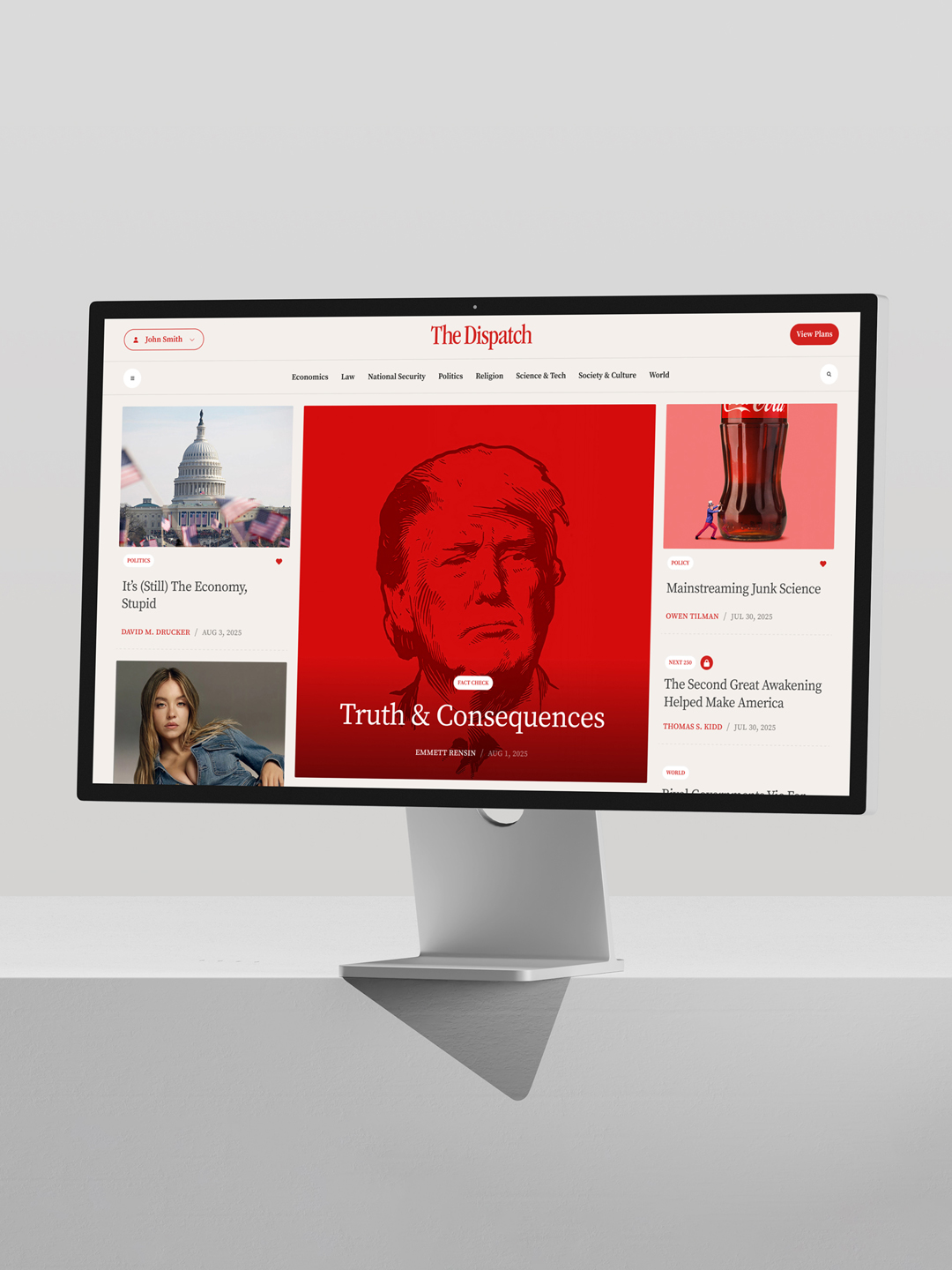
Have You Seen Our New Look?
Our vision has been to build a website that matches the quality of the journalism we have been producing since October 2019. We wanted the brand to reflect the values upon which we were founded: civility, thoughtfulness, humility, independence, optimism. And as the information environment becomes increasingly dominated by artificial intelligence and social media algorithms, we knew our look needed to emphasize the humanity behind everything we publish. Check out the new site.
Will the Courts Reverse Trump’s Tariffs?

According to Solicitor General D. John Sauer, the stakes of the legal challenge against President Donald Trump’s tariffs “could not be higher.”
“If you took away tariffs, we could end up being a third-world country,” Trump said Tuesday at the White House. Days before, he wrote on Truth Social that “If these Tariffs ever went away, it would be a total disaster for the Country,” and “would literally destroy the United States of America.” On a Sunday Fox News appearance, adviser Peter Navarro made no effort to lower the stakes: “If we lose the case, President Trump is right — it will be the end of the United States.”
This calamitous chatter was in response to an August 29 ruling from the U.S. Court of Appeals for the Federal Circuit, in which a 7-4 majority ruled the administration has no authority to impose either the “reciprocal tariffs” announced on April 2 or import duties placed on Canada, China, and Mexico in February, supposedly to curb the flow of illicit fentanyl. This upholds a unanimous opinion from the U.S. Court of International Trade (CIT) and notably does not apply to industry-specific tariffs on steel, aluminum, and cars, which were implemented under Section 232 of the Trade Expansion Act of 1962.
As a non-paying reader, you are receiving a truncated version of The Morning Dispatch. You can read our full item in the members-only version of TMD.
The court said that all these duties could stay in place through October 14—giving time for the White House to appeal the ruling—and the order’s enforcement will remain suspended until the Supreme Court rules on the case or declines to hear a challenge. On Wednesday night, the White House petitioned the Supreme Court to take up the case and hear arguments by early November. Sauer justified the urgency by writing the Appeals Court ruling “casts a pall of uncertainty upon ongoing foreign negotiations that the President has been pursuing through tariffs over the past five months, jeopardizing both already negotiated framework deals and ongoing negotiations.”
The Supreme Court is likely to take up the case because, as Brookings Institution fellow and former diplomat Scott Anderson told TMD, “when the executive branch asks the Supreme Court to weigh in on a national security or foreign relations case, the Supreme Court always does.”
When Trump enacted his tariffs, he claimed he had authority to do so under the International Emergency Economic Powers Act (IEEPA). Passed by Congress in 1977, the law states that during a declared national emergency, the president may “regulate … importation.”
Congress passed this as part of post-Watergate reforms limiting presidential emergency powers, and presidents generally cite their authority under IEEPA to issue expedited sanctions against foreign actors. Indeed, every president since the law’s passage—from former President Jimmy Carter to Trump—has issued sanctions through IEEPA on several occasions, including to block the sale of imports, bar access to U.S. financial institutions and markets, prevent certain foreign governments from acquiring U.S. property, and deny visas. IEEPA actions are not required to be published in the Federal Register to seek public comment, an often time-consuming process. As such, Anderson said, “Almost all global sanctions are rooted back in IEEPA.”
When litigating challenges to sanctions enacted through IEEPA, courts have generally ruled that national security concerns in specific time-sensitive scenarios warrant decisive decision-making. “In other contexts … we’ve seen lots of litigation around IEEPA,” Anderson explained. But with sanctions, courts have usually been pretty broadly deferential to the executive branch in how they interpret and apply it. And the Trump administration knows this.”
But do the president’s powers through IEEPA extend to tariff power? Lawyers for the Liberty Justice Center—who brought the original case to CIT on behalf of five small businesses—argued that Congress clearly had no intention of giving away its constitutional authority to “lay and collect Taxes, Duties, Imposts and Excises” to the president, as the law’s text makes no direct mention of tariffs or taxation. They also note that no other president has ever attempted to levy duties through the law.
Beyond the CIT ruling, which stated that IEEPA does not greenlight the president “to regulate importation by means of tariffs,” courts have not yet ruled on this question. But in a concurring opinion at the appeals court, four judges in the majority wrote that they did not interpret IEEPA as allowing the president to enact any tariffs. “One group of four judges would have held that IEEPA … simply doesn’t authorize tariffs,” regardless of whether the national emergency is justified, Duke University law professor Timothy Meyer told TMD. “The split among the majority, to me, suggests that this scope of tariff authority under IEEPA remains unresolved.”
Under the major questions doctrine, the Supreme Court has also restrained the executive branch from assuming sweeping power constitutionally reserved for Congress, which, as Anderson explained, requires “very specific and considered authorization to give any agency such broad, ranging authority.” In the 2022 case West Virginia v. Environmental Protection Agency, the Supreme Court’s majority held that courts should “hesitate before concluding that Congress meant to confer such authority.”
“The government’s argument is that the term ‘regulates’ includes the power to tax, and, if you can regulate importation, that’s the power to tax imports or impose tariffs,” Meyer said. Still, he noted that the administration’s interpretation takes some bold and unprecedented leaps: “The word ‘regulate’ appears in lots of statutes, and as far as anyone can tell, outside of this context, nobody has ever suggested that the term ‘regulate’ includes the power to impose a tax.”
But even if the court approves some tariff levies enacted under IEEPA, perhaps in a moment of crisis, there’s the question of whether Trump’s declared emergencies—trade deficits and illicit fentanyl smuggling—clear the bar.
Congress passed IEEPA to ensure that during an international crisis, the president could take swift, decisive action. The law gives “the president extensive power, not unlimited power, but extensive power to deal with crises,” Kathleen Claussen, a Georgetown Law School professor and a former U.S. Trade Representative Office associate general counsel, explained to TMD. “When Congress passed the statute, the intent was that they could not foresee all the possibilities of what might come along, so it’s written in an intentionally broad way.”
The White House argues that, because of the threats posed by negative trade deficits with foreign nations and illicit fentanyl brought from Canada, China, and Mexico, tariffs can be used as diplomatic leverage to gain a trade deal favorable to Trump and to crack down on drug trafficking in countries where fentanyl is produced. “The federal government has used IEEPA to impose economic sanctions, trying to get countries to change their behavior in a number of different circumstances,” Meyer said. For example, Carter invoked sanctions on Iran under IEEPA in 1979 in response to the Iranian hostage crisis, and, more recently, former President Joe Biden enacted sanctions on Russia through the law following President Vladimir Putin’s invasion of Ukraine in 2022.
To the White House, Trump’s IEEPA tariffs are legally no different from those sanctions. Courts have given prior administrations leeway to act in response to national security concerns, so why would Trump not have the same power in foreign policy-related matters?
But it’s a tough argument to make. “Even if IEEPA did allow the president to impose tariffs in some circumstances, [the challengers] add, doing so requires a ‘national emergency,’ and the tariffs must address an ‘unusual and extraordinary threat’ to the ‘national security, foreign policy, or economy of the United States,’” Amy Howe recently wrote at SCOTUSblog. “But trade deficits have existed for decades and are hardly an emergency, the challengers emphasize.”
Similarly, the CIT panel ruled that fentanyl-related tariffs were illegal because there’s no indication that hiking up import duty rates reduces drug smuggling, and thereby “do not deal with the threats” cited by the administration.
The Supreme Court is almost sure to take up these questions, and—according to the rhetoric of the president and his advisers—the very continuance of the United States.
Today’s Must-Read
I don’t have any problem with optimists. Some of my best friends are optimists! But on the question of artificial intelligence, the noise of their exuberance distracts from problems for which there are no easy solutions. The optimists note that being a Luddite hasn’t traditionally paid. Indeed, those who voiced concerns about the introduction of the electric streetlight (on account of what it would mean for the careers of the lamplighters, then employed in cities across the world to ignite the gas at dusk) are not attractive role models. But for some nagging concerns, the optimists are on their firmest ground when they argue that the AI boom is likely to contribute to long-run economic growth, even allowing for some bubbles and contractions and political difficulties along the way.
Why would we default to the negative notion that the latest step forward in the digital revolution is surely a terrible misstep? To quote Thomas Babington Macaulay, the 19th-century English historian and Whig politician, “On what principle is it that with nothing but improvement behind us, we are to expect nothing but deterioration before us?” While past performance may not guarantee future success, it’s not a bad starting point for analysis. Yes, some argue that society is worse off thanks to computers and the internet—always “on call” for work, privacy eroded by algorithm tracking, and children glued to screens. These may be real downsides, but hardly proof that cyberprogress diminishes human experience.
Toeing the Company Line
Axis of Evil 2.0
Does MAGA want a multipolar world or not?
Saying the Quiet Part Out Loud
Is it okay to ignore the Constitution if doing so serves Trump’s purposes?
Scenes From a Protest on the Delaware Shore
How some grassroots Democrats are coping with Trump's second term.
The False Pretenses Behind the Naval Operation Off the Coast of Venezuela
The nation is not a major source of drugs to the U.S., for starters.
Vice Week | Interview: Charles Fain Lehman
‘I am professionally against fun.’
Worth Your Time
- “America is becoming a nation of economic pessimists” is the first sentence of a Wall Street Journal story on a new poll finding that “the share of people who say they have a good chance of improving their standard of living fell to 25%, a record low in surveys dating to 1987.” It’s a noticeable change in the American self-conception, and one worth paying attention to: “Nearly 70% of people said they believe the American dream—that if you work hard, you will get ahead—no longer holds true or never did, the highest level in nearly 15 years of surveys. Republicans in the survey were less pessimistic than Democrats, reflecting the longstanding trend that the party holding the White House has a rosier view of the economy. An index that combined six poll questions found that 55% of Republicans, as well as 90% of Democrats, held a negative view of prospects for themselves and their children. The discontent reaches across demographic lines. By large majorities, both women and men held a pessimistic view in the combined questions. So did both younger and older adults, those with and without a college degree and respondents with more than $100,000 in household income, as well as those with less.”
- Surrogacy is a controversial practice but growing in popularity, becoming a $5 billion industry in 2024. Emi Nietfeld writes in Wired— a piece with the headline “The Baby Died. Whose Fault Is It?”—is about a case where the pregnancy went wrong, and how the prospective mother went after her surrogate. “Cindy Bi is not supposed to be telling me this story. First, there’s the confidentiality clause. When Bi, a venture capitalist who claims to have invested in a dozen unicorns, hired a surrogate to carry her only male embryo in 2023, both parties agreed to keep the details private and away from the media. Then there’s the restraining order against Bi, followed by a court-ordered agreement saying she would not so much as mention the ‘surrogate’ involved in Baby Leon’s stillbirth. Finally, there are social norms to consider when publicly attacking the woman who says she almost died carrying your child. Still, Bi is talking to me. She sends me a nearly 3,000-item folder filled with legal filings; reports to professional organizations, insurance companies, employers, and the police; emails with her attorneys; and correspondence between her and the ‘Egg Whisperer’ influencer, Dr. Aimee. Bi considers herself a whistleblower out to protect ‘unborn children via surrogacy.’ Her website invokes scripture: ‘Establish justice in the courts. Amos 5:15.’ Indeed, Bi has racked up nearly a million dollars in legal bills since 2024, in what she views as a fight to honor her son. ‘I want the surrogate to be known for what she did, to be set as an example,’ Bi tells me. ‘I hope she goes to jail.’ Ideally, for murder.”
Presented Without Comment
The Hill: Trump Calls Epstein Disclosures Battle ‘A Democrat Hoax’
President Trump was dismissive Wednesday of the latest round of bipartisan pressure to release files related to convicted sex offender Jeffrey Epstein, calling it an effort to distract from his administration’s successes.
“So, this is a Democrat hoax that never ends. You know, it reminds me a little of the Kennedy situation,” Trump said in the Oval Office, referencing documents related to the assassination of former President Kennedy. “We gave them everything over and over again, more, and more and more. And nobody is ever satisfied. From what I understand, thousands of pages of documents have been given.
“But it’s really a Democrat hoax, because they’re trying to get people to talk about something that’s totally irrelevant to the success we’ve had as a nation since I’ve been president,” Trump added.
Also Presented Without Comment
BBC: Luigi Mangione’s Likeness Used to Model Shirt on Shein
Also Also Presented Without Comment
New York Times: Trump Advisers Have Discussed a Job for Adams to Quit Mayor’s Race
Let Us Know
Have any thoughts or questions about today’s newsletter? Drop us a note in the comments!


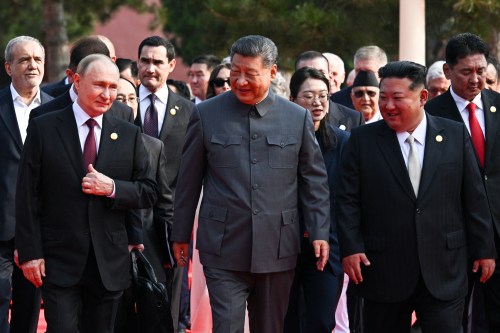
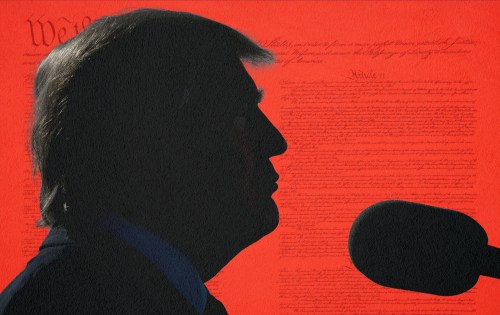
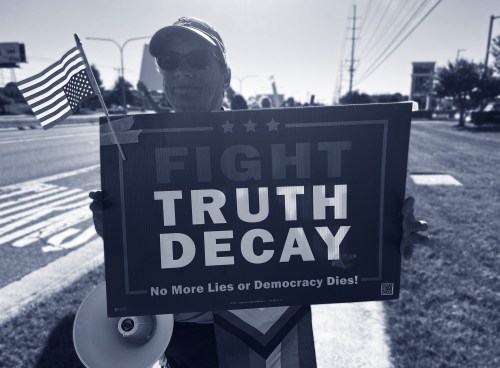

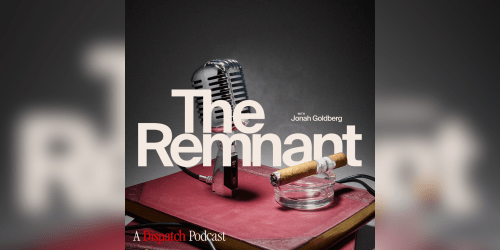




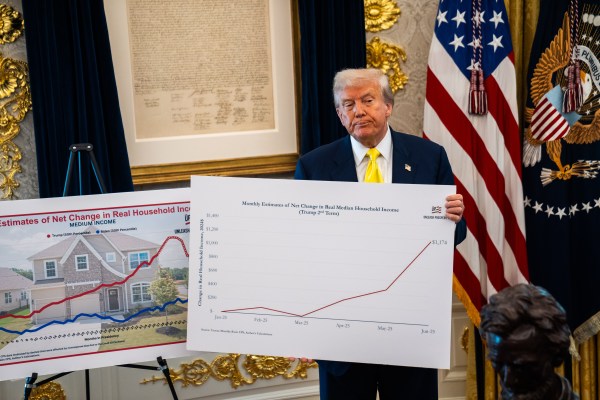

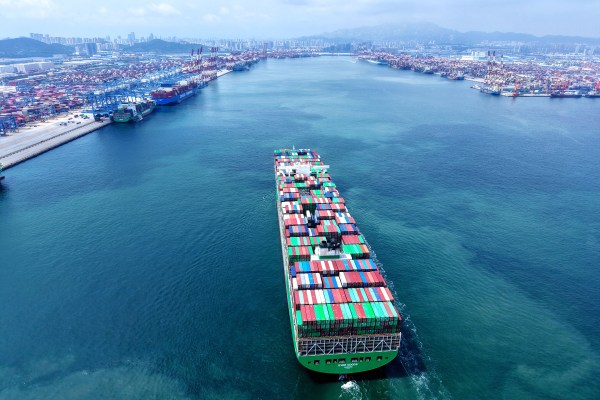

Please note that we at The Dispatch hold ourselves, our work, and our commenters to a higher standard than other places on the internet. We welcome comments that foster genuine debate or discussion—including comments critical of us or our work—but responses that include ad hominem attacks on fellow Dispatch members or are intended to stoke fear and anger may be moderated.
With your membership, you only have the ability to comment on The Morning Dispatch articles. Consider upgrading to join the conversation everywhere.